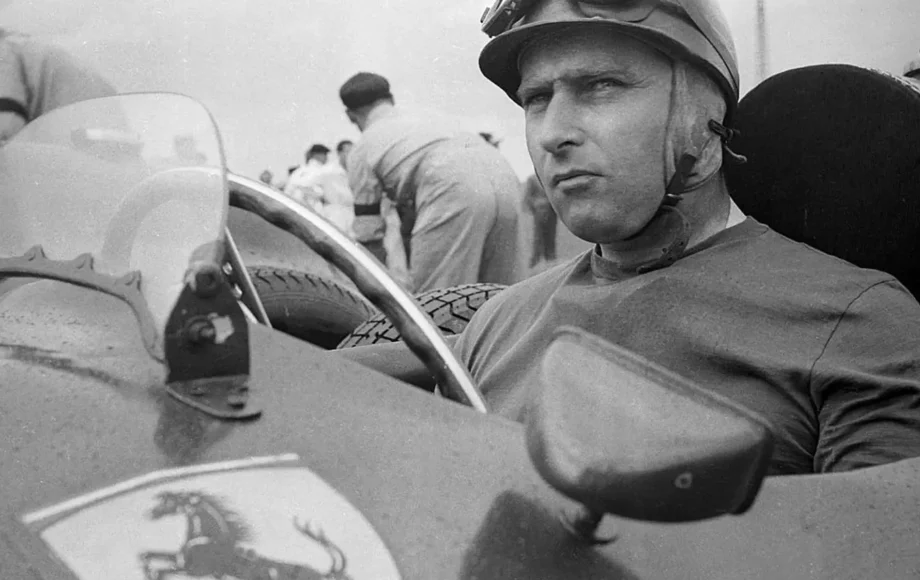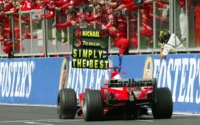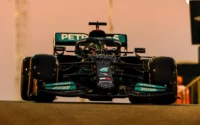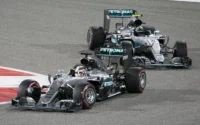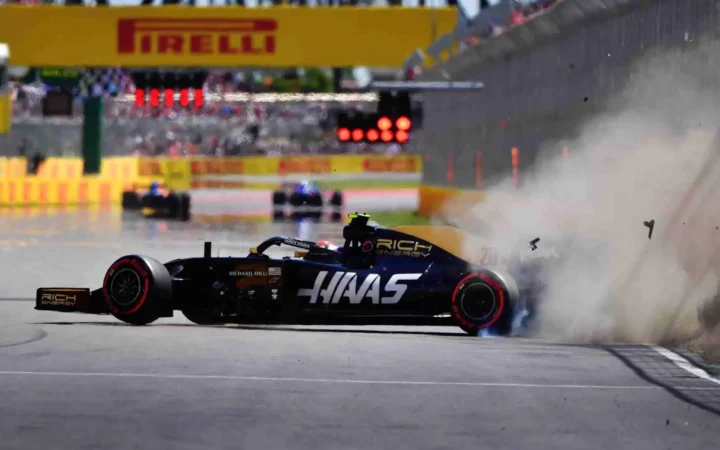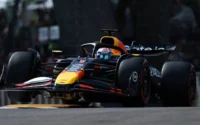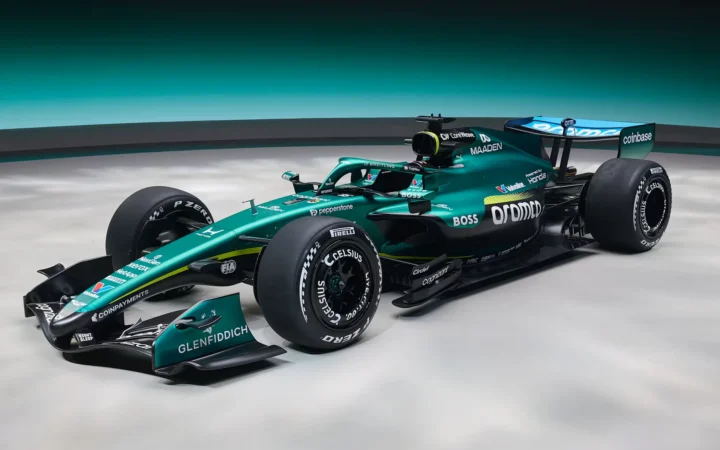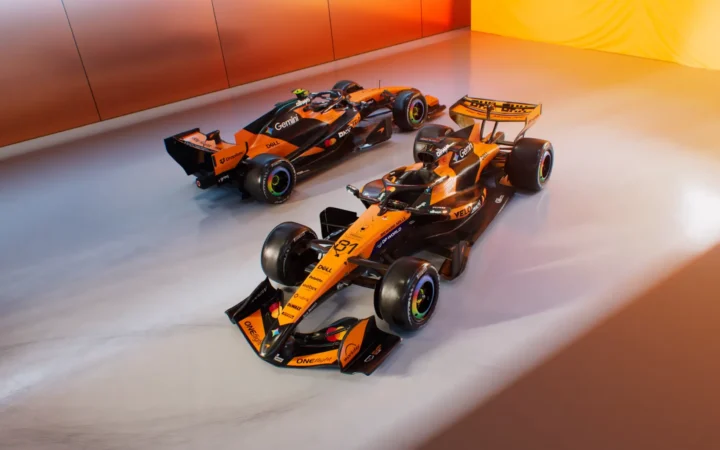Since the first Formula 1 season in 1950, only a select few drivers have managed to string together more than two consecutive world titles — a feat that defines genuine dominance in motorsport’s highest tier. Aside from winning, these drivers have stayed on top when every team, every car, and every rival has been evolving to beat them.
What To Know?
- Only five drivers in F1 history have won three or more consecutive world championships.
- Michael Schumacher holds the record with 5 consecutive titles from 2000 to 2004.
- Max Verstappen, with four consecutive titles (2021–2024), joins an elite group including Fangio, Vettel, and Hamilton.
Most consecutive F1 Championships
As of the 2025 season, that standard of sustained brilliance belongs to Max Verstappen. With his fourth straight championship clinched under the lights of Las Vegas in the 2024 Championship, the Dutchman firmly planted himself among the sport’s greatest drivers. He became only the fifth driver in F1 history to win at least three titles in a row, and just the third to do it in the modern era.
So, who else has reached this level of back-to-back brilliance? Let’s take a look at the lofty company Verstappen now keeps.
| Seasons | Driver | Seasons |
|---|---|---|
| 5 | Michael Schumacher | 2000, 2001, 2002, 2003, 2004 |
| 4 | Juan Manuel Fangio | 1954 , 1955 , 1956 , 1957 |
| Sebastian Vettel | 2010, 2011, 2012, 2013 | |
| Lewis Hamilton | 2017, 2018, 2019, 2020 | |
| Max Verstappen | 2021, 2022, 2023, 2024 | |
| 2 | Alberto Ascari | 1952, 1953 |
| Jack Brabham | 1959 , 1960 | |
| Alain Prost | 1985, 1986 | |
| Ayrton Senna | 1990, 1991 | |
| Michael Schumacher | 1994, 1995 | |
| Mika Hakkinen | 1998, 1999 | |
| Fernando Alonso | 2005, 2006 | |
| Lewis Hamilton | 2014, 2015 | |
| Max Verstappen | 2021, 2022 |
5 Titles: Michael Schumacher (2000–2004)
Winning Streak Stats
Team: Ferrari
Wins: 48 from 85 starts
Poles: 40
Podiums: 66
Michael Schumacher held a five-year reign from 2000 to 2004 over the F1 paddock and remains the benchmark for sustained dominance in Formula 1. It was the payoff to a bold move made years earlier: when Schumacher left Benetton as a double back-to-back world champion to join a struggling Ferrari squad in 1996. At the time, the Scuderia hadn’t claimed a Drivers’ title since 1979.
His arrival was the catalyst for a transformation. Alongside key figures like technical director Ross Brawn and designer Rory Byrne—both recruited from Benetton—Schumacher helped turn Ferrari into a winning machine. The first sign of that resurgence came in 1999 with the Constructors’ title. A year later, Schumacher delivered the Drivers’ crown, sealing his third career championship with one round to spare.
Formula One History Recommends
From there, the dominance only grew. Four more titles followed in succession, with only one—2003—going down to the final race. Even then, he edged out a rising Kimi Räikkönen by just two points. But 2004 was the peak: 12 wins in the first 13 races and a then-record 148 points, sealing his seventh and final championship in emphatic style.
Schumacher’s streak finally ended in 2005 as new regulations tripped up Ferrari and ushered in a new era led by Fernando Alonso at Renault. However, the legacy of Schumacher’s red reign remains unmatched as of 2025.
4 Titles: Max Verstappen (2021–2024)
Winning Streak Stats
Team: Red Bull Racing
Wins: 52 from 88 starts
Poles: 37
Podiums: 69
Max Verstappen has gone from teenage sensation to arguably the greatest driver in Formula 1 history and motorsport. The youngest F1 driver to start—and later win—a Grand Prix (the 2016 Spanish GP, aged just 18y227d), Verstappen’s raw speed and racecraft were obvious from day one. But it wasn’t until the 2021 season that he finally had the machinery to challenge Mercedes‘ long-standing dominance.
Armed with an upgraded Honda engine and a strong Red Bull chassis, Verstappen went toe-to-toe with Lewis Hamilton in one of the most intense title battles the sport has seen. After a season of on-track clashes, controversy, and relentless pace, the championship came down to the infamous final lap at the 2021 Abu Dhabi Grand Prix. A late-race safety car and contentious restart decision opened the door for Verstappen to snatch victory—and his maiden world title—in dramatic but controversial fashion.
Full Race Report
His absolute domination, though, began with the new regulations in the 2022 season. Red Bull nailed the technical changes, and Verstappen took full advantage. He cruised to the 2022 and 2023 championships, the latter becoming the most dominant season in F1 history. With 19 wins, 10 consecutive victories, and 21 podiums, Verstappen shattered records and redefined consistency at the front.
Formula One History Recommends
In 2024, he continued his relentless form, winning four of the first five races. But as the season wore on, the field began to close in. Lando Norris and Charles Leclerc both broke through with landmark wins, and Verstappen faced his longest winless stretch in years. Yet he responded like a champion—his brilliant drive at the 2025 Sao Paulo Grand Prix in Brazil ended the drought and effectively sealed the title.
A fifth-place finish in Las Vegas was all he needed to clinch his fourth consecutive world championship, putting him in privileged company.
4 Titles: Lewis Hamilton (2017–2020)
Winning Streak Stats
Team: Mercedes
Wins: 42 from 78 starts
Poles: 37
Podiums: 61
From 2017 to 2020, Lewis Hamilton was the undisputed benchmark in Formula 1. After losing the 2016 title to teammate Nico Rosberg in a tense season finale at the 2016 Abu Dhabi Grand Prix, Hamilton returned with renewed focus and a new teammate in Valtteri Bottas. The next four seasons would see Hamilton at the peak of his powers—fast, composed, and relentlessly consistent.
Full Race Report
The 2017 season brought significant regulation changes, and while Ferrari emerged as a serious challenger with Sebastian Vettel, Hamilton responded with precision. After trailing at the summer break, he surged back by winning five of the next six races and secured the championship with two rounds to spare. A similar story unfolded in 2018—Vettel again led early, but Hamilton’s calm execution and strong second half earned him a fifth title.
By 2019, Ferrari had fallen back, and Mercedes reasserted its dominance. Bottas was Hamilton’s closest rival on paper, but the Briton’s level of performance left little room for threat. The 2019 and 2020 seasons saw Hamilton win with authority, wrapping up both titles comfortably. In 2020, he topped Michael Schumacher’s legendary tally of 91 wins, becoming F1’s all-time race winner at the 2020 Portuguese Grand Prix.
Hamilton’s four-title streak came to a dramatic end in 2021. On course for a record-breaking eighth championship, he was leading the Abu Dhabi finale until a controversial late-race safety car period allowed Max Verstappen to snatch the title on the final lap. Still, Hamilton’s dominant run from 2017 to 2020 remains one of the most complete and commanding spells in Formula One history.
4 Titles: Sebastian Vettel (2010–2013)
Winning Streak Stats
Team: Red Bull Racing
Wins: 34 from 77 starts
Poles: 40
Podiums: 53
Sebastian Vettel’s four consecutive titles with Red Bull from 2010 to 2013 was one of the most dominant periods in modern F1 history. At just 23, he became the youngest world champion ever in 2010, capping off a dramatic season where he didn’t lead the championship until he crossed the line in Abu Dhabi. Red Bull’s technical edge—particularly with the RB6’s clever use of the double diffuser—was fundamental to his breakthrough.
His second title in 2011 was a masterclass in control. Armed with the RB7, Vettel crushed the field with 11 wins and 15 pole positions. He wrapped up the championship with four rounds to spare, establishing himself as the new force in F1.
Red Bull faced more resistance in 2012 as regulation tweaks reshuffled the pecking order. Fernando Alonso built a commanding lead mid-season with Ferrari, but a major Red Bull upgrade ahead of Singapore changed the narrative. Vettel won four races on the bounce and sealed a third title in a tense finale at Interlagos.
In 2013, Vettel was virtually untouchable. After a competitive first half of the year, he went on a historic charge, winning nine consecutive races to close out the season—a record only beaten by Max Verstappen. He secured his fourth title with three rounds to spare at just 26 years old.
That incredible run, however, ended abruptly with the dawn of the turbo-hybrid era in 2014. Red Bull slipped back, Vettel failed to win a race that year, and he moved to Ferrari for a new challenge. But his four-title streak remains one of the great chapters in F1’s modern era, defined by pace and relentless success.
4 Titles: Juan Manuel Fangio (1954–1957)
Winning Streak Stats
Teams: Maserati (1954, 1957), Mercedes (1954–1955), Ferrari (1956)
Wins: 17 from 28 starts
Poles: 18
Podiums: 21
Long before the turbo-hybrids and telemetry, Juan Manuel Fangio was the gold standard in Formula 1. Between 1954 and 1957, the Argentine legend won four consecutive world championships, displaying a level of skill and versatility that made him untouchable in his era.
His 1954 campaign was historic—not just for the title itself, but for how he achieved it. Fangio started the season with Maserati, then switched to Mercedes mid-year when the German marque returned to racing. He won races for both teams and became the only driver in F1 history to win a championship driving for more than one constructor in a single season.
Fangio continued his dominance with Mercedes in 1955, sealing the title again with ease. But tragedy at that year’s Le Mans 24 Hours—where over 80 spectators were killed—led Mercedes to withdraw from motorsport altogether, ending their partnership with Fangio.
He moved to Ferrari in 1956, inheriting the potent Lancia D50 chassis. Despite tensions within the team and pressure from young star Stirling Moss at Maserati, Fangio claimed his fourth title in a dramatic season finale.
With Ferrari unwilling to meet his salary demands, Fangio returned to Maserati in 1957 and produced one of the most iconic seasons in F1 history. Four wins, including a legendary charge at the Nürburgring, earned him a fifth and final crown—at the age of 46.
Fangio stepped away from the sport mid-1958, but his four-title streak—and five overall championships—stood as the benchmark in Formula 1 for nearly 50 years.
…And The Rest
While only five drivers have managed three or more titles in succession, several greats have achieved back-to-back world championships—a feat that still saw a period of unmistakable dominance.
- Alberto Ascari – 2 titles (1952, 1953) – Ferrari’s first dominant champion
- Jack Brabham – 2 titles (1959, 1960) – The only driver to win in a car of his own make
- Alain Prost – 2 titles (1985, 1986) – Precision and consistency defined his peak
- Ayrton Senna – 2 titles (1990, 1991) – Iconic wins and intense rivalries marked his reign
- Michael Schumacher – 2 titles (1994, 1995) – His first titles, before Ferrari dominance
- Mika Häkkinen – 2 titles (1998, 1999) – McLaren’s cool and clinical frontman
- Fernando Alonso – 2 titles (2005, 2006) – Ended Schumacher’s streak and ushered in a new era
- Lewis Hamilton – 2 titles (2014, 2015) – Dominant in early hybrid-era Mercedes
- Max Verstappen – 2 titles (2021, 2022) – The start of a now historic championship run
Some of these back-to-back champions might not have extended their streaks to three, but each had a moment where they were firmly the driver to beat.
Seen in:

